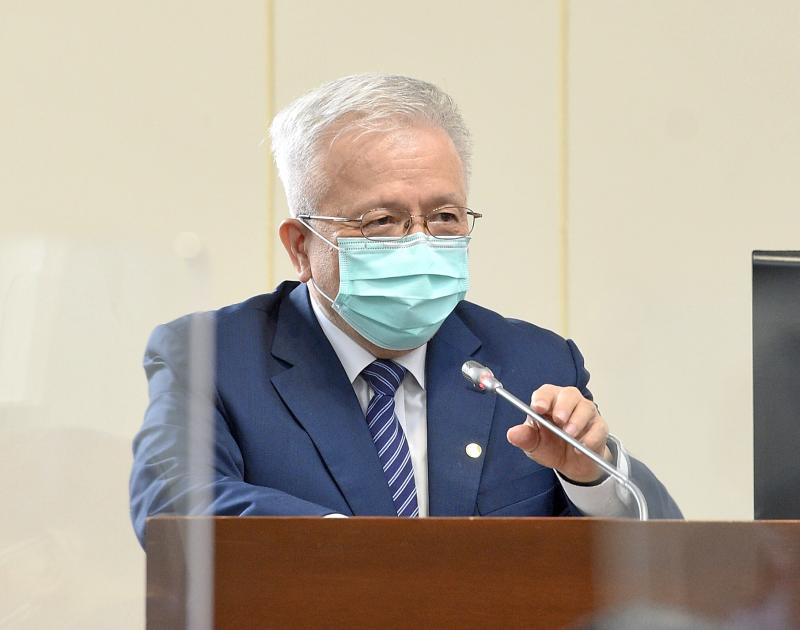A stronger US dollar is taking a toll on the local currency by fueling volatility on local financial markets and adding pressure to imported inflation, a phenomenon the central bank will address at its quarterly board meeting next month, central bank Deputy Governor Yen Tzung-ta (嚴宗大) said yesterday.
As of yesterday, the New Taiwan dollar had tumbled 7.51 percent against the greenback this year, as the US Federal Reserve tightens to curb inflation.
Since the beginning of the year, the TAIEX has shed 12.32 percent as global funds retreated from Taiwan and other emerging markets in the pursuit of better yields elsewhere.

Photo: Lo Pei-der, Taipei Times
The weighted index yesterday closed 1.7 percent lower at 16,020.32 points, Taiwan Stock Exchange data showed.
“The trend not only weighed on the NT dollar, but also hit the currencies of other emerging economies and augmented their debt problems,” Yen told a meeting of the legislature’s Economics Committee.
Yen refused to be pinned down about the central bank’s policy intentions, only saying that the board meeting on June 16 has the final say on the matter.
Consumer prices and the inflation outlook sit atop the central bank’s list of concerns, while the job market and GDP growth would also guide the decisionmaking process, he said.
Taiwan’s consumer prices are forecast to pick up by more than 2 percent this year after rising faster than 3 percent in the past two months, mainly due to spiking international energy and commodity prices, the deputy governor said.
Inflationary pressures could ease in the second half of the year alongside a receding base effect, he added.
The US and Europe have to make drastic policy moves to bring down inflation induced by their money-printing programs to shore up their economies amid the COVID-19 pandemic, Yen said.
Inflationary readings are relatively moderate in Taiwan, giving policymakers room to look at things from a different perspective, he said.
Central bank Governor Yang Chin-long (楊金龍) last week said that Taiwan might have difficulty achieving a GDP growth of 4 percent this year, as worsening inflation, global monetary tightening and the Ukraine war could hurt exports and corporate profit from the second half of the year.
Yen agreed, saying that resurgent virus outbreaks worldwide pose further uncertainty.
Surging daily cases of the Omicron variant of SARS-CoV-2, which hit 90,331 yesterday, have prompted people to stay home, slowing recovery for sectors reliant on domestic demand.
Yen hinted that the central bank might intervene in the local foreign exchange market to help stabilize the NT dollar.

A magnitude 5.6 earthquake struck off the coast of Yilan County at 12:37pm today, with clear shaking felt across much of northern Taiwan. There were no immediate reports of damage. The epicenter of the quake was 16.9km east-southeast of Yilan County Hall offshore at a depth of 66.8km, Central Weather Administration (CWA) data showed. The maximum intensity registered at a 4 in Yilan County’s Nanao Township (南澳) on Taiwan’s seven-tier scale. Other parts of Yilan, as well as certain areas of Hualien County, Taipei, New Taipei City, Taoyuan, Hsinchu County, Taichung and Miaoli County, recorded intensities of 3. Residents of Yilan County and Taipei received

Taiwan has secured another breakthrough in fruit exports, with jujubes, dragon fruit and lychees approved for shipment to the EU, the Ministry of Agriculture said yesterday. The Animal and Plant Health Inspection Agency on Thursday received formal notification of the approval from the EU, the ministry said, adding that the decision was expected to expand Taiwanese fruit producers’ access to high-end European markets. Taiwan exported 126 tonnes of lychees last year, valued at US$1.48 million, with Japan accounting for 102 tonnes. Other export destinations included New Zealand, Hong Kong, the US and Australia, ministry data showed. Jujube exports totaled 103 tonnes, valued at

TRUST: The KMT said it respected the US’ timing and considerations, and hoped it would continue to honor its commitments to helping Taiwan bolster its defenses and deterrence US President Donald Trump is delaying a multibillion-dollar arms sale to Taiwan to ensure his visit to Beijing is successful, a New York Times report said. The weapons sales package has stalled in the US Department of State, the report said, citing US officials it did not identify. The White House has told agencies not to push forward ahead of Trump’s meeting with Chinese President Xi Jinping (習近平), it said. The two last month held a phone call to discuss trade and geopolitical flashpoints ahead of the summit. Xi raised the Taiwan issue and urged the US to handle arms sales to

BIG SPENDERS: Foreign investors bought the most Taiwan equities since 2005, signaling confidence that an AI boom would continue to benefit chipmakers Taiwan Semiconductor Manufacturing Co’s (TSMC, 台積電) market capitalization swelled to US$2 trillion for the first time following a 4.25 percent rally in its American depositary receipts (ADR) overnight, putting the world’s biggest contract chipmaker sixth on the list of the world’s biggest companies by market capitalization, just behind Amazon.com Inc. The site CompaniesMarketcap.com ranked TSMC ahead of Saudi Aramco and Meta Platforms Inc. The Taiwanese company’s ADRs on Tuesday surged to US$385.75 on the New York Stock Exchange, as strong demand for artificial intelligence (AI) applications led to chip supply constraints and boost revenue growth to record-breaking levels. Each TSMC ADR represents